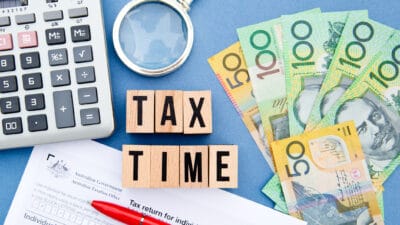Most of us would like to pay less tax, that's a given. Though we all accept tax as the price we pay for a civilised society, it's never fun seeing that money leave our paycheques.
However, many intricacies of the tax system are lost on the ordinary Australian. And fair enough — tax isn't exactly the most riveting of subjects. But what if I told you that investing in ASX dividend shares is a great way to legally reduce your tax bills?
It might sound like a fantasy. However, investing in ASX dividend shares can indeed help lower the amount of tax you're legally required to pay.
It can do so in two ways. And both of these will not lead to any unwelcome visits by the Australian Tax Office (ATO) if done correctly.
How investing in dividend shares can (legally) lower your tax bill
Tax hack 1: Harvesting franking credits
When you buy an ASX dividend share, you will typically receive two dividend payments every year. The ATO classes these dividends as ordinary income. That means you will pay the same level of tax on this income as you will on the salary from your ordinary day job.
However, most ASX dividends will also come with at least some franking credits attached. This is what can help to reduce your overall tax burden. Franking credits are essentially tax deductions that reflect the tax the company has already paid on this cash.
Just as workers are subject to income tax, businesses are subject to corporate tax. This is normally levied at a rate of 30%.
When a company pays out a dividend, it must do so from its after-tax profits. This means the dividend cheque you receive has come from a pot of taxed profits. If you had to pay full income tax on this money, the cash would have effectively been taxed twice.
This is inherently unfair. The ATO acknowledges this by allowing investors to claim the tax already paid on the dividend as a franking credit.
So alongside your dividend income, you also get a proportionate tax deduction in the form of these franking credits. These allow you to reduce the tax you already have to pay on other income.
As such, franked dividend income is some of the most tax-effective income you can receive.
Tax hack 2: Paying less when you sell your ASX dividend shares
Let's say you buy 1,000 shares of an ASX dividend share with a share price of $10, resulting in an investment of $10,000. Two years later, those shares have risen to $20. So you decide to sell them to help buy your family a new home.
Since you invested $10,000 but pulled out $20,000, you now have to declare that additional $10,000 as a capital gain. This is put on top of your ordinary income.
However, the ATO usually allows you to enjoy a 50% discount on any capital gains from assets you've held for longer than one year. So since our investor has held their shares for two years, they would only have to pay tax on $5,000 of that $10,000 profit.
That is a perk that is only available for investment assets. It makes the profits you can get from buying ASX dividend shares some of the most tax-effective income there is.
Foolish takeaway
These strategies are just guidelines so you should definitely consult with your own tax professional to learn how they can apply to your own personal situation.
But the fact is that investing in ASX divided shares offers most Australians some of the best legal tax dodges available in our system. So what are you waiting for?









